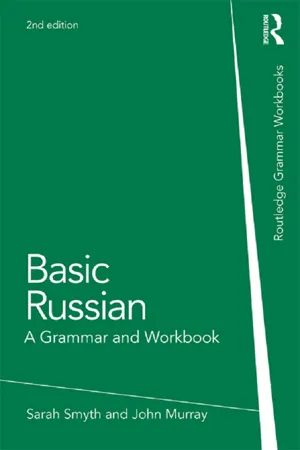
eBook - ePub
Basic Russian
A Grammar and Workbook
John Murray, Sarah Smyth
This is a test
- 384 Seiten
- English
- ePUB (handyfreundlich)
- Über iOS und Android verfügbar
eBook - ePub
Basic Russian
A Grammar and Workbook
John Murray, Sarah Smyth
Angaben zum Buch
Buchvorschau
Inhaltsverzeichnis
Quellenangaben
Über dieses Buch
Designed for students with a basic knowledge of Russian, this book provides an accessible reference grammar and related exercises in a single volume.
Across more than forty grammar topics it introduces the student to Russian people and culture through the medium of the language used today, covering the core material which the student would expect to encounter in their first year of learning Russian.
Complete with a full key to exercises and glossary, Basic Russian is a user-friendly reference grammar suitable for both independent study and class use.
Häufig gestellte Fragen
Wie kann ich mein Abo kündigen?
Gehe einfach zum Kontobereich in den Einstellungen und klicke auf „Abo kündigen“ – ganz einfach. Nachdem du gekündigt hast, bleibt deine Mitgliedschaft für den verbleibenden Abozeitraum, den du bereits bezahlt hast, aktiv. Mehr Informationen hier.
(Wie) Kann ich Bücher herunterladen?
Derzeit stehen all unsere auf Mobilgeräte reagierenden ePub-Bücher zum Download über die App zur Verfügung. Die meisten unserer PDFs stehen ebenfalls zum Download bereit; wir arbeiten daran, auch die übrigen PDFs zum Download anzubieten, bei denen dies aktuell noch nicht möglich ist. Weitere Informationen hier.
Welcher Unterschied besteht bei den Preisen zwischen den Aboplänen?
Mit beiden Aboplänen erhältst du vollen Zugang zur Bibliothek und allen Funktionen von Perlego. Die einzigen Unterschiede bestehen im Preis und dem Abozeitraum: Mit dem Jahresabo sparst du auf 12 Monate gerechnet im Vergleich zum Monatsabo rund 30 %.
Was ist Perlego?
Wir sind ein Online-Abodienst für Lehrbücher, bei dem du für weniger als den Preis eines einzelnen Buches pro Monat Zugang zu einer ganzen Online-Bibliothek erhältst. Mit über 1 Million Büchern zu über 1.000 verschiedenen Themen haben wir bestimmt alles, was du brauchst! Weitere Informationen hier.
Unterstützt Perlego Text-zu-Sprache?
Achte auf das Symbol zum Vorlesen in deinem nächsten Buch, um zu sehen, ob du es dir auch anhören kannst. Bei diesem Tool wird dir Text laut vorgelesen, wobei der Text beim Vorlesen auch grafisch hervorgehoben wird. Du kannst das Vorlesen jederzeit anhalten, beschleunigen und verlangsamen. Weitere Informationen hier.
Ist Basic Russian als Online-PDF/ePub verfügbar?
Ja, du hast Zugang zu Basic Russian von John Murray, Sarah Smyth im PDF- und/oder ePub-Format sowie zu anderen beliebten Büchern aus Languages & Linguistics & Languages. Aus unserem Katalog stehen dir über 1 Million Bücher zur Verfügung.
Information
PART 1
Identifying and describing people, places and objects
UNIT 1
Identifying people
Gender
(i) Nouns are classified in Russian according to three genders: masculine, feminine and neuter. The grammatical gender of a noun, which is constant, can usually be identified by its ending in the nominative case, that is, the dictionary form of the noun. In this unit we concentrate on nouns that refer to people. These are usually masculine or feminine nouns. Masculine nouns refer to men, feminine nouns to women. (See Unit 3 for nouns referencing objects and places and for the introduction of neuter nouns.)
Masculine nouns end in a consonant, a consonant followed by a soft sign (-ь) or a vowel followed by the semi-consonant (-й).
hard | consonant | музыкант | Иван |
soft | consonant + -ь | писатель | Игорь |
soft | vowel + -й | герой | Николай |
Feminine nouns end in -a, -я, -ия or -ь. Note that the ending -ь may indicate either a masculine or feminine noun.
hard | consonant + -a | балерина | Анна |
soft | consonant + -я | Катя | |
soft | consonant + -ь | Любовь | |
soft | consonant + -ия | Анастасия |
(ii) Generally speaking males are designated by masculine nouns and females by feminine nouns.
Note: There are, however, some nouns ending in -a or -я which designate males. These nouns, though they look like feminine nouns, are grammatically speaking masculine, e.g., мужчина ‘man’, дядя ‘uncle’, дедушка ‘grandfather’; a number of first names, such as Илья, Никита, Фома; and many affectionate forms of names, such as Kоля(short for Николай), Ваня (short for Иван) and Петя(short for Пётр). These nouns are qualified by masculine adjectives, e.g. хороший мужчина ‘a good man’ (see Unit 4).
‘Hard’ and ‘soft’ endings
As can be seen from the tables above some nouns have what are called ‘hard’ endings and others ‘soft’ endings. The categories of ‘hard’ and ‘soft’ refer to the quality of the final consonant as realised in the vowel that follows it.
‘Hard’ endings are represented in the written language by a consonant followed by:
• a zero ending (no ending) which in some grammar books is represented as Ø
• or one of the following vowels: -а, -у, -ы or -o
‘Soft’ endings are represented in the written language by a consonant followed by:
• a soft sign: -ь
• or one of the following vowels: -я, -ю, -и, -ё or -е
This distinction is easy to remember once you realise that Russian has two renditions of every...
Inhaltsverzeichnis
Zitierstile für Basic Russian
APA 6 Citation
Murray, J., & Smyth, S. (2013). Basic Russian (2nd ed.). Taylor and Francis. Retrieved from https://www.perlego.com/book/1615083/basic-russian-a-grammar-and-workbook-pdf (Original work published 2013)
Chicago Citation
Murray, John, and Sarah Smyth. (2013) 2013. Basic Russian. 2nd ed. Taylor and Francis. https://www.perlego.com/book/1615083/basic-russian-a-grammar-and-workbook-pdf.
Harvard Citation
Murray, J. and Smyth, S. (2013) Basic Russian. 2nd edn. Taylor and Francis. Available at: https://www.perlego.com/book/1615083/basic-russian-a-grammar-and-workbook-pdf (Accessed: 14 October 2022).
MLA 7 Citation
Murray, John, and Sarah Smyth. Basic Russian. 2nd ed. Taylor and Francis, 2013. Web. 14 Oct. 2022.